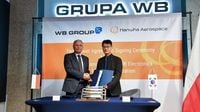On April 18, 2025, a significant strategic partnership was forged between South Korea’s Hanwha Aerospace and Poland’s WB Group, aimed at establishing a joint project for the production of guided missiles on Polish soil. This agreement marks a pivotal moment in defense collaboration between the two nations, as they aim to manufacture the CGR-80 missiles, which have a range of up to 80 kilometers.
The CGR-80 missiles are specifically designed for the Homar-K multiple rocket launcher system, the Polish variant of the Chunmoo K239. This collaboration not only strengthens the defense capabilities of Poland but also positions it to export these advanced missile systems to other defense markets across Europe.
The signing ceremony was attended by high-ranking officials, including Polish Deputy Minister of National Defense Pawel Bejda and South Korean Ambassador to Poland Hoon Min Lim. Peter Bai, the CEO of Hanwha Aerospace in Europe, also participated in the event, emphasizing the importance of this partnership in enhancing bilateral defense relations.
According to the terms of the agreement, Hanwha Aerospace will hold a 51% majority stake in the joint venture, while WB Electronics, a subsidiary of the WB Group, will own the remaining 49%. This arrangement reflects Hanwha's commitment to deepening industrial ties with Poland and supplying advanced weapon systems to its armed forces.
Moreover, this partnership is a continuation of Hanwha Aerospace's previous contracts with Poland, which included the supply of 290 Chunmoo (K239) rocket launcher systems capable of launching guided missiles with ranges between 80 and 290 kilometers. This cooperation is set to enhance Hanwha's role in the defense sector by ensuring that the Chunmoo systems are fully compatible with the advanced command, control, communications, computers, intelligence, surveillance, and reconnaissance (C4I) systems produced by the WB Group.
In a related development, Polish President Andrzej Duda has voiced the need for Poland to secure French nuclear deterrent capabilities in response to potential threats from Russia. In an interview with Bloomberg, Duda expressed openness to acquiring both French and American nuclear weapons, stating, "I believe I can accept both solutions... There is no contradiction between the two ideas." This statement reflects Poland's ongoing efforts to bolster its defense posture amidst rising tensions with Russia.
Prime Minister Donald Tusk also indicated in a recent parliamentary session that Poland is pursuing nuclear capabilities and is engaged in serious discussions regarding President Emmanuel Macron's proposal to utilize French nuclear capabilities for the defense of European allies.
The context for these discussions is heightened by Russian President Vladimir Putin's declaration in 2023 regarding the deployment of tactical nuclear weapons in Belarus, a move that has alarmed NATO member states in Eastern Europe. Duda emphasized that NATO's role is to counter Russian aggression, suggesting that the alliance should expand its nuclear deployment to include Polish territory.
However, Poland's pursuit of nuclear capabilities may face challenges, as the French nuclear shield operates independently from NATO's security guarantees, which extend to Poland. Additionally, Poland is bound by its commitments under the Treaty on the Non-Proliferation of Nuclear Weapons, which prohibits the acquisition of nuclear arms.
This dual approach—strengthening conventional and nuclear capabilities—illustrates Poland's determination to enhance its defense infrastructure in light of evolving geopolitical threats. The collaboration with Hanwha Aerospace and the potential acquisition of nuclear capabilities signify a strategic pivot for Poland as it seeks to assert its security interests within the NATO framework.
As the landscape of European defense continues to evolve, partnerships like the one between Hanwha Aerospace and WB Group will play a crucial role in shaping the future of military capabilities on the continent. The emphasis on advanced missile systems, coupled with discussions of nuclear deterrence, highlights the urgent need for nations to adapt to new security challenges.
In conclusion, the strategic agreement between South Korea and Poland represents a significant step towards enhancing defense cooperation, while Poland's pursuit of nuclear capabilities underscores its proactive stance in ensuring national security amidst regional uncertainties.


